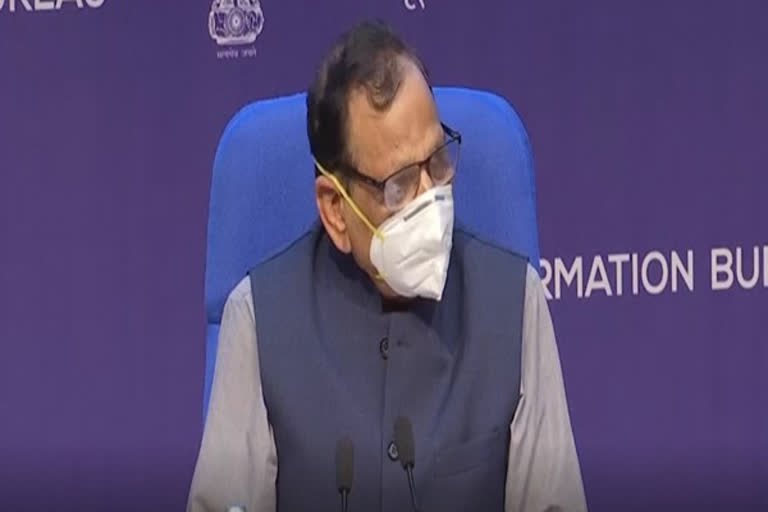New Delhi: Amid growing concern over the third wave of the Covid-19 pandemic in India, the Centre on Friday said that the next 100-125 days will be critical for the country. "There is a decreasing trend of the Covid cases across India. However, cases in several pockets are still a matter of concern. Next 100-125 days will be crucial for India as far as the third wave is concerned," said Dr VK Paul, chairperson of the National Task Force on Covid-19 in New Delhi.
He was responding to the reporters on the possible timeline for the third wave. The World Health Organisation (WHO) has already issued a "red flag" predicting an increase in Covid cases in many regions which will be the beginning of the third wave. Notably, scientists in the Indian Council of Medical Research (ICMR) have also hinted that a possible third wave may come by August.
Read:| Health Ministry sounds alert over third wave of Covid-19
Emphasising that unlocking of the system cannot be taken for granted, Dr Paul said many countries have already started witnessing a huge jump of Covid cases. "There is a 64 per cent increase of Covid cases in Spain whereas Netharland witnessed a 300 per cent spike," said Dr Paul. "The third wave may come in India because a majority of our population are still susceptive to the virus. We have not developed hard immunity through infection," said Dr Paul.
He said that along with Covid appropriate behaviour vaccination could also play a crucial role in averting all waves in India. Referring to the Moderna vaccine, Dr Paul said that the US-based company had to reply to some queries. "The talks with Moderna is on. But it is not yet concluded. We have asked for some more queries," added Dr Paul. Talking on the third wave, Lav Agarwal, Joint Secretary in the Health Ministry said that waves are based on the post facto evaluation on the management of the situation.
"Waves are natural and as time pass, different waves may come. But we need to be alert. We have to maintain proper behaviour and get vaccinated," said Agarwal. He also said that increase community mobility may also impact the spread of infection. "States across India have been witnessing high mobility which may spread the Covid infection. However, with the resumption of activities and mask usage is also declining. From 74 per cent in July the use of masks has also been showing a declining trend," said Agarwal.
When asked about the sudden decrease of vaccination from 88 lakh that was reported on June 21 to 40 lakh on an average at present, Agarwal said that it's a wrong analysis of data. "From the Central government's side, we keep discussing the vaccine production issue with the manufacturers. We also look into how much production is reaching the cities and towns. And the logistics issue is also linked to production. So, the amount of production we get from the manufacturer, 75 per cent we distribute free of costs to the states and UTs. And as the production increase, the state's capacity will also increase," said Agarwal adding that sometimes there could be a mismatch in the coordination.
Read:| INSACOG detects 22 Delta plus variants of Covid19 in India: Health Secretary
Health Ministry statistics show that 47 districts in 12 states across India are still reporting a Covid positivity rate of more than 10 per cent. Manipur (9), Kerala (8) and Rajasthan (6) are the top three states with a maximum number of districts reporting more than 10 per cent positivity. Significantly, India also witnessed a reduction of 458 districts in terms of higher cases being reported. As many as 531 districts have been witnessing 100 daily cases till May 4 but as of July 14, the number of districts registering 100 daily cases has come down to 73.
Meanwhile, data from the India SARS-CoV-2 Genome Consortium (INSACOG) said that the proportion of known variants of concern that are in circulation in the country remain unchanged from the proceeding week. "Delta sub-lineages AY.1 and AY.2 are declining globally with news zero cases in the last week of June in either UK or US where they were most frequently seen. They also continue to be below 1 per cent in available sequences from June in India. It is likely that neither AY.1 nor AY.2 is more transmissible than Delta," the INSACOG has said in its weekly bulletin.
The consortium, however, said that the continuing outbreaks across India are attributable to Delta, susceptible population and opportunities for transmission. "Public health measures and reduce transmission and vaccination remain critical," the consortium said.
Read:| 3rd Covid wave is in our hands, vaccine key solution: VK Paul



